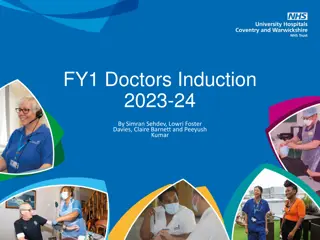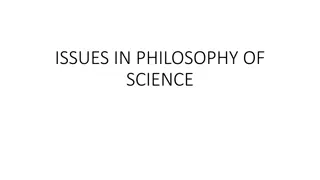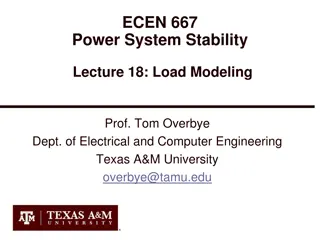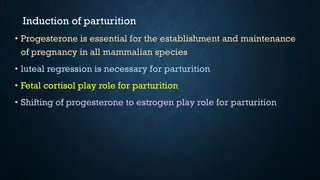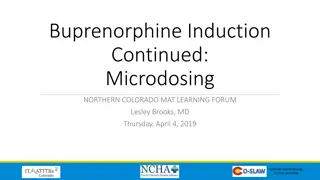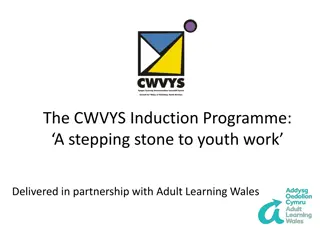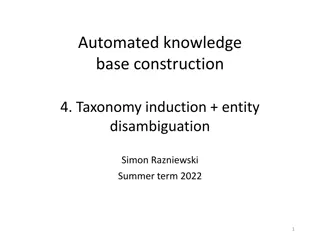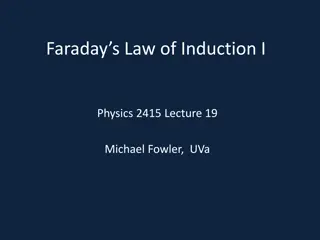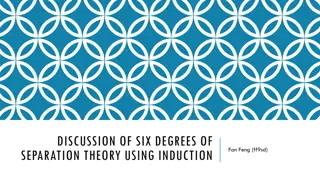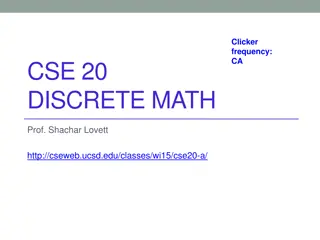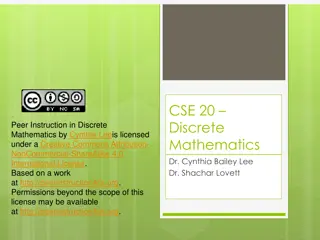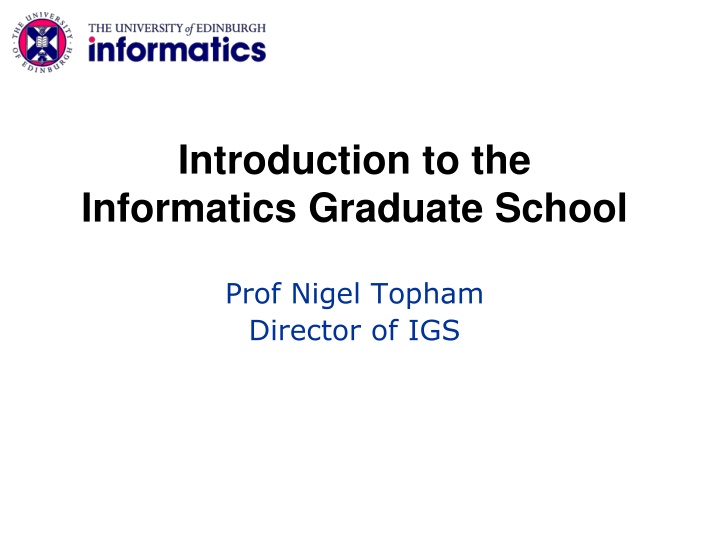
Informatics Graduate School Overview and Community Diversity
Discover the Informatics Graduate School (IGS) at the University of Edinburgh, a large community of postgraduate research students offering degrees such as MScR, MPhil, and PhD. Learn about the University's supportive structure, including the Doctoral College, and the diverse community of research students from different nationalities. Explore the emphasis on Equality, Diversity, and Inclusion within the Informatics department, ensuring a respectful and inclusive environment for all.
Download Presentation

Please find below an Image/Link to download the presentation.
The content on the website is provided AS IS for your information and personal use only. It may not be sold, licensed, or shared on other websites without obtaining consent from the author. If you encounter any issues during the download, it is possible that the publisher has removed the file from their server.
You are allowed to download the files provided on this website for personal or commercial use, subject to the condition that they are used lawfully. All files are the property of their respective owners.
The content on the website is provided AS IS for your information and personal use only. It may not be sold, licensed, or shared on other websites without obtaining consent from the author.
E N D
Presentation Transcript
Introduction to the Informatics Graduate School Prof Nigel Topham Director of IGS
What is the Informatics Graduate School (IGS)? Large community of postgraduate research students Degrees: MScR, MPhil, PhD, PhD with IS plus visiting research students Academic and administrative staff (ISS) Information sources for postgraduate student http://web.inf.ed.ac.uk/infweb/ student-services/igs 2
University Structure - Where you fit in. SCHOOL COLLEGE CENTRAL UNIVERSITY You are part of each large and diversity community across the whole University 3
University Structure - Where you fit in. University of Edinburgh Doctoral College The Doctoral College supports and enhances the postgraduate research student experience in a number of different ways. It brings together staff from across the University who work with PGR students to work collaboratively and share practice They coordinate training, support, events and opportunities for PGRs across the University They represent PGR at University level committees and groups They support and enhance the PGR student representation structures and make sure your voice is heard. Various social events running, follow @UoE_Doc for notifications Webpage - https://www.ed.ac.uk/students/doctoral-college Sharepoint - https://uoe.sharepoint.com/sites/DoctoralCollege Twitter - https://twitter.com/uoe_doc?lang=en 4
Our Community of PG Research Students 633 research students enrolled on INF PGR programmes; 88% PhD, 7% MScR/MPhil, 5% visiting students Our community is: from 67 different nationalities 98% full time, 2% part time 28% female, 70% male, 2% undisclosed, 21% UK, 34% EU, 45% International 102 new PGRs started their research degrees in 23/24 (so far ). This includes 38 of new students enrolling on one of our three CDT programmes 11 in Natural Language Processing (NLP) 10 in Biomedical Artificial Intelligence *BMAI) 6 in Robotics & Autonomous Systems (11 more at Heriot-Watt) 13 (non-CDT) MScR students Successful students selected from over 1300 applicants. 5
Equality, Diversity and Inclusion (EDI) Informatics is home to big and diverse community; lots of different nationalities, cultures, religions, genders, sexualities, races, abilities, etc Dignity and Respect Policy applies to all staff and students at UoE Everyone is expected to treat all equally, and with dignity and respect Enjoy your freedom and give it generously to others Language and communication can be misinterpreted but misunderstandings do not mean conflict or disagreement; ask if you are unsure. Zero tolerance approach to bullying, harassment or discrimination. Dignity and Respect Champions are available for conversations and advice. Support the activities of the School s People and Culture Committee 6
Research Excellence World-leading academic staff (140+), post- docs (150+), support teams (130+), and you! Specialised labs, including manipulating, flying, rolling, and walking robots 100s of GPUs, access to 1000+ CPU machines 6 Research Institutes with main focus on: Theory (LFCS), Communication (ILCC), AI (AIAI), Learning (IANC), Systems (ICSA), Robotics (IPAB) Seminars, visitors, conferences 50+ taught courses that you can access as class only students Commercialisation support (top start-up department in UK) 7
Research Excellence Recent PGR successes celebrated by the School include: Two PGR authored papers were awarded Outstanding Paper at the 61st Annual Meeting of the Association for Computational Linguistics (ACL'23) Extrinsic Evaluation of Machine Translation Metrics by Nikita Moghe, Tom Sherborne, Mark Steedman and Alexandra Birch Compositional Generalization without Trees using Multiset Tagging and Latent Permutations by Matthias Lindemann, Alexander Koller and Ivan Titov Verna Dankers, Vivek Iyer and Tom Sherborne were also awarded Outstanding Reviewer at the ACL Conference (2023) Yifu Qiu was the successful recipient of the 2023 Apple Scholars in AI/ML PhD fellowship, recognizing emerging leaders in computer science and engineering and their cutting-edge machine learning research.B lint Gyevn r awarded the UKRI Trustworthy Autonomous Systems (TAS) Early Career Researcher Award. Jonghyuk Park (and supervisors) received the best long paper award at the 15th International Conference on Computational Semantics (IWCS 2023). Pauliina Vuorinen published a lay audience article on reading research following her research project on adults' recreational e-reading behaviour last summer. Georgia-Ann Carter came runner-up in the Open Research Award category at the Good Research Practice awards - run by the University of Edinburgh to recognise and celebrate contributions that provide leadership and act as role models for good research practice. Sarenne Wallbridge won the Best Student Paper Award at Interspeech (2022). Bhargavi Ganesh won a best paper award at the We Robot 2022 conference for a project looking at a Responsibility Framework for Governing Trustworthy Autonomous Systems. 8
Research Excellence WHY YOUR PG RESERCH MATTERS The School of Informatics remains among the top Computer Science and Informatics research institutions in the UK, according to 2021 Research Excellence Framework results. The School of Informatics and EPCC top 2021 rankings for power, market share and FTE entered. We scored 1000 for research power (UCL which is next in this category scored 699), and 7.59 for market share (UCL came second again with a score of 5.34). 100% of our impact case studies are world-leading 100% of our research environment is world leading 61% of our research outputs are world-leading (4*) and 33.4 % are internationally excellent (3*) 76% of our REF submission overall is world-leading and 21 % is internationally excellent PGR led research made a significant and important contribution to achieving this result 9



